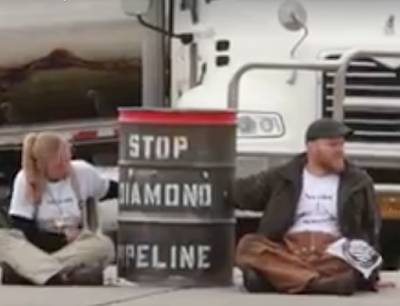 |
| Olivia Ramirez awaits her hearing May 2, 2017, in Memphis Moore Media Images |
Katherine Hanson of Missouri; Olivia Ramirez and Erick Conner
of Oklahoma, and Spencer Kaaz of Memphis have trial dates set for Jan. 22, 2018, in Criminal Court Division
III before Judge Robert Carter in Memphis. They were among seven
persons who were chained to concrete-filled
barrels in front of Valero Refinery on MLK Day Jan. 16, 2017.
They were expressing opposition to construction of the Diamond
Oil Pipeline, from Cushing, Oklahoma, to the Valero Refinery in Memphis.
Calling themselves “water protectors,” they made their bold statement in
conjunction with environmental activists Arkansas Rising.
NO REGRETS
“I haven’t and I never will regret taking direct action,” said
Ramirez, who includes the Osage Tribe among her ancestors, in a Facebook post.
“I love my people. I love this land.”
The four were originally charged with
disorderly conduct, obstructing a highway or passageway and criminal trespass. The
disorderly and trespass charges were dismissed on May 2. The defendants
expect the January trial will last three days.
They are the last remaining defendants whose cases have not
been disposed of, from 12 persons who were originally arrested at the Valero
action. Three of the seven who sat in the Valero driveways paid court costs and
pleaded out. Cases were dismissed for all five of the others arrested,
including Rachel Gay, an independent journalist, and Paul Garner, who was
acting as an observer and recording the action on his cell phone.
 |
| Olivia Ramirez (left), Erick Conner (right) wait with friend May 2, 2017 Moore Media Images |
‘LIKE JAYWALKING’
Michael Working, whose law firm is representing two of them pro bono, said after a May 2 preliminary hearing that the charge of
obstructing a highway is “like jaywalking.”
Police typically charge “obstructing a highway or passageway”
and/or “disorderly conduct” when there are no actual crimes committed or
perceived violations are vague. Those are go-to charges against public First
Amendment practitioners, aka protesters. Five persons arrested at the Aug. 19,
2017, rally to remove Confederate statues were charged with disorderly conduct,
and two were charged with obstructing a highway. All seven of those cases have been dismissed, the final two being dismissed this month when the arresting officer -- who had written on his affidavit, "an unlawful protest was underway" -- failed to show up for the preliminary hearing.
It is rare that such a minor charge, a Class C Misdemeanor, goes
to trial. At May 2 preliminary hearings, judges expressed sympathy with the
defendants and cited First Amendment rights, before finding there was “probable
cause” for the charges. The three were indicted in August.
In another in a string of court appearances, on Oct. 5 Shelby County prosecutors offered the defendants a "deal" to get off the hook -- that they pay about $24,000, $6,000 apiece, ostensibly to offset Memphis police and fire department expenses. Needless to say, the defendants did not bite on that one, and attorneys advised it was an illegal and unethical ploy.
Although tanker trucks were coming and going, even as the water protectors sat in the entrance and exit driveways, it was police and Valero officials who decided to block Mallory Avenue and its Interstate exit and to stop truck traffic. Truckers were lined up for more than four hours waiting to get into the refinery.
Although tanker trucks were coming and going, even as the water protectors sat in the entrance and exit driveways, it was police and Valero officials who decided to block Mallory Avenue and its Interstate exit and to stop truck traffic. Truckers were lined up for more than four hours waiting to get into the refinery.
Police also had access blocked to adjacent MLK Park – yes, on
MLK Day.
MLK AND ENVIRONMENTAL
JUSTICE
Some observers credit Dr. Martin Luther King Jr. with expressing
core beliefs of environmental justice.
“It really boils down to this: that all life is interrelated. We
are all caught in an inescapable network of mutuality,” King said in a
Christmas 1967 sermon.
“We are not satisfied and will not be satisfied until justice rolls
down like water and righteousness like a mighty stream,” said King, who was
aware that industrial pollution takes its heaviest toll on poor
neighborhoods.
Here are links to a later story in DailyKos -- and two of our earlier stories -- on the Valero action
and subsequent court action.
"DA Pushes Misdemeanor Defendant-Protesters toward Jury Trial in Memphis"
https://www.dailykos.com/stories/2018/1/3/1729690/-DA-Pushes-Misdemeanor-Defendant-Protesters-toward-Jury-Trial-in-Memphis
“Valero Cases Dwindle as Judges Cite First Amendment”
"DA Pushes Misdemeanor Defendant-Protesters toward Jury Trial in Memphis"
https://www.dailykos.com/stories/2018/1/3/1729690/-DA-Pushes-Misdemeanor-Defendant-Protesters-toward-Jury-Trial-in-Memphis
“Valero Cases Dwindle as Judges Cite First Amendment”
“Cops Bust
a Journalist, Chase One into the Bushes on MLK Day 2017”



No comments:
Post a Comment